Composer / Educator Hunter Johnson
A Conversation with Bruce Duffie
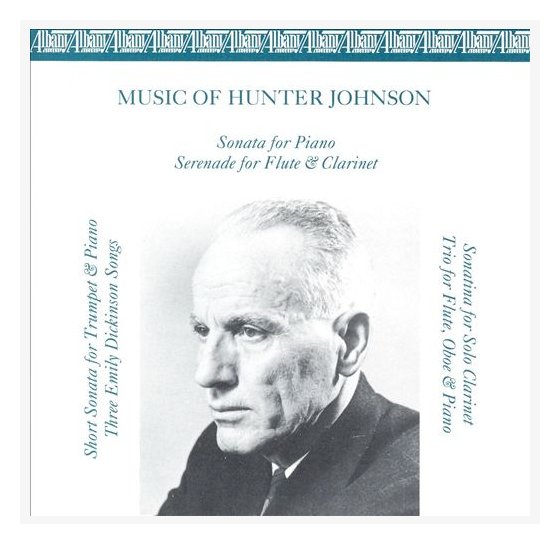
Hunter Johnson (April 14, 1906 - August
27, 1998) was an American composer. His compositions include a piano sonata
and the orchestral music for Martha Graham's ballets Letter to the World, based on the life
and poetry of Emily Dickinson, and Deaths
and Entrances. His musical style was a combination of neoclassic,
neoromantic, and nationalist.
Johnson was born near Benson, North Carolina. He attended Benson High School
and the University of North Carolina at Chapel Hill before leaving the state
to finish his undergraduate studies at the Eastman School of Music in 1929.
UNC later awarded him an honorary doctorate. He taught at the University
of Michigan (1929–33), the University of Manitoba (1944–7), Cornell (1948–53),
the University of Illinois (1959–65) and the University of Texas (1966–71).
He retired in 1971 and returned to the family farm in Benson. He was the
first composer laureate of North Carolina, an award he received in 1991.
|
Most broadcasting stations that do interview segments have
not only the on-air talent who are seen or heard, but also support staff
that arrange things and set things up and do research and other preparation,
as well as engineers to handle the technical requirements. In my situation
at WNIB, Classical 97 in Chicago I had none of those luxuries. I was
my own support staff and did my own engineering. While this made it
more work for me, it also allowed me a great freedom to meet whom I liked,
and set things up in ways that suited both my guest and me.
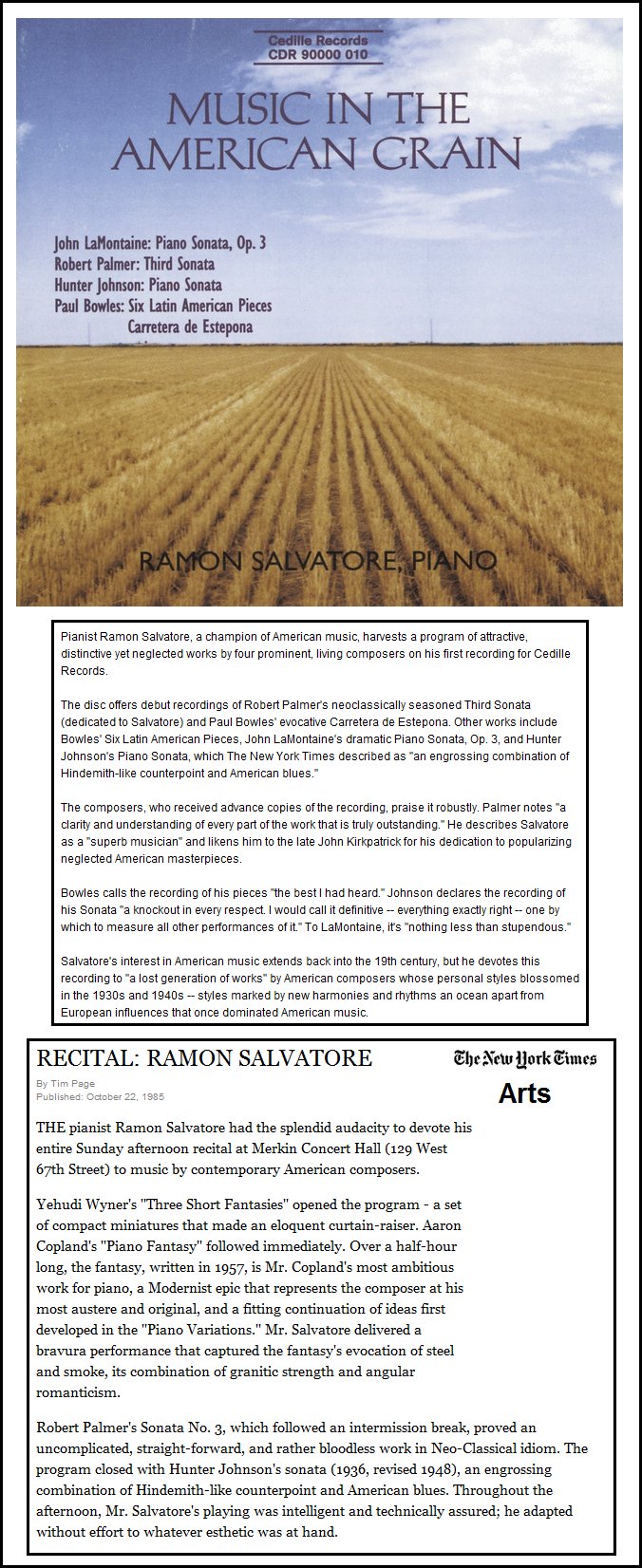 In gathering material, I sought out musicians that interested me, and sometimes
one guest would suggest others, and even provide me with contact information.
Such was the case with Hunter Johnson.
In gathering material, I sought out musicians that interested me, and sometimes
one guest would suggest others, and even provide me with contact information.
Such was the case with Hunter Johnson.
The pianist Ramon Salvatore
had been a previous guest in my series, and because he made his home in the
Chicago area, we stayed in touch whenever possible. After a series
of concerts, he mentioned one of the composers he had just played, and I
jumped at the chance to add Hunter Johnson to my list of interview guests.
[Vis-à-vis the box at right, see my interviews with John La Montaine,
Robert Palmer, and Paul Bowles.]
Since the first use of the interview was to be on the radio, Johnson paid
me a nice compliment to begin . . . . . . .
Hunter Johnson:
You’ve an excellent voice for announcing and giving information. Very
sharp, clear voice.
Bruce Duffie: Thank
you very much. I’m glad I’m able to use it on the air and for doing
interviews!
HJ: By the way,
do you know Ray Salvatore?
BD: Yes.
He’s the one who gave me your address!
HJ: Oh, yes, oh
good. He’s been playing my Piano Sonata
quite a bit. In fact several pianists have been playing it in the last
few years in Europe and in this country. It’s been extremely well received,
popular with the young college crowd! They’d never heard it before.
They would ask where it’s been all these years, and Ray would say, “You
have both the score and the recording in your library. Go, look it
up!” [Both laugh]
BD: I knew Ray
many years ago, and then I lost track of him. Recently I contacted
another composer who’s a friend of his, named Robert Palmer.
HJ: Oh, yes, I’ve
known Palmer for many years.
BD: Palmer suggested
to Ray that he call me, not knowing that we were old friends. So Ray
got in touch with me a couple of weeks ago or so, and we reacquainted ourselves
now that he’s back here in the Chicago area. We were talking about
other composers and he mentioned that he had been playing your Sonata, and suggested that if I had not
already contacted you for an interview that I should do so right away.
So I immediately grabbed the chance because you had been on my hit list for
a while.
HJ: Oh, yes.
Very good.
BD: You’ve been
teaching music for a number of years. Is it theory or composition,
or both?
HJ: Theory and
composition. I’ve been retired for some time, but while I was teaching
I worked with mostly in advanced theory and composition, including graduate
students working towards their master’s and doctor’s degree. I taught
it at several universities over years — University
of Michigan in Ann Arbor, Cornell University, University of Illinois, University
of Manitoba up in Winnipeg, and finally the University of Texas. The
reason I taught at so many universities was I found I could not mix composition
and teaching too well. I just didn’t have that kind of energy, I suppose,
and so I would teach a few years and then take off a year or two or three,
win a prize perhaps or scholarship, compose for a while and then go back
to teaching. I was always fortunate to be able to get a good position,
and I enjoyed teaching enormously. In fact I’ve always thought of my
career as being a combination of composing and teaching.
BD: But you couldn’t
do both at the same time because the teaching took too much energy?
HJ: When I was
in my twenties, I was teaching at the University of Michigan and I could
mix the two pretty well. I had loads of energy then, but I threw myself
into teaching a little more intensively than many teachers do, and that tends
to take up extra energy. But I thoroughly enjoyed teaching. I
always thought of myself as a combination of the two even when I was a kid.
As a matter of fact, when growing up my great ambition was to be both, to
be a creative artist. I wasn’t sure at that time whether it would be
as a writer or as a composer, and a college professor! In fact Musical America started off an article
about me calling me ‘composer-educator’!
BD: Do you approve
of that euphemism?
HJ: Well, I don’t
mind it. I’d never thought about it before that. I’d like to
think that my composition is more important. It really has been a little
more important to me than teaching, much as I enjoy teaching
BD: We’ll come
back to the composition in just a little while, but I want to stick with
the teaching for a moment. How did the students change and progress
over the many years that you did teach them?
HJ: That’s a little
bit hard to answer. Some have had success. The various students
I had worked in a much simpler idiom than students in later years, and so
what they did was easier for them. It’s easier to evaluate. Over
the years the approach to music changed, especially 50s and 60s. They
thought of music as primarily an experimental thing. Each individual
had to be as far out and as absolutely possible, and it proved a problem
some times. I never taught electronic music, for example, but I could
evaluate it pretty well, and that’s almost a mistake as I don’t think it’s
always possible to evaluate anything as new as electronic music, at least
not as easy to evaluate as earlier music. But in my later teaching
years I had more gifted students. In the earlier years I had a mixture
of people who just wanted to take composition because they were interested
in it, not having, perhaps, too much time or talent. There were some
with a medium amount of talent and some who wanted to become professionals,
but in later years my teaching of composition was limited pretty much to
singers and graduate students. By that time the weaklings had been
weeded out, and so I had very good material to work with, particularly at
the University of Illinois and the University of Texas. A considerable
number of my students took their doctorates under my supervision, and wrote
in a great variety of styles. So my approach to teaching composition
is always to nurture what a student has, to let him find his own way and
not try to impose my own style on him. It’s difficult some times, especially
in the beginning phases to the students’ development, to find out just what
is his strongest point it, what he’s driving towards. But in the end
I was able to determine that. I was just doing the best I could towards
his own goal, and I am happy to say that I don’t think any of my students
sounded like me. I never forget the number of students I used to run
into who had other teachers, and they all sounded like Hindemith!
BD: What did you
look for in evaluating the music of your students?
HJ: First thing
I look for is what I would call a personal profile, a distinct individuality
in the music, not just repeating what everybody else was doing. A personal
profile, some real individuality was what I was looking for more than anything
else, and I had great success in finding that and nurturing that. That
approach tends to be a little difficult when you get into the serial area
and chance music and that sort of thing. I realize that, but it’s possible
to find that kernel, that core of individuality even in more difficult idioms.
BD: What else did
you look for after you found the individuality?
HJ: Productivity
and technical countenance, technical ease, ease of writing. I guess
that’s about it!
BD: You could encourage
technique and help to shape their technique, but could you also encourage
the inspiration?
HJ: Oh, yes!
I think so by enthusiasm and praise, particularly when they didn’t know there’s
something there that no one else has done. I would point it out to
them in the music, and show how to achieve it technically. That they
always respond to.
BD: Then where
is the balance between the inspiration and the technical ability?
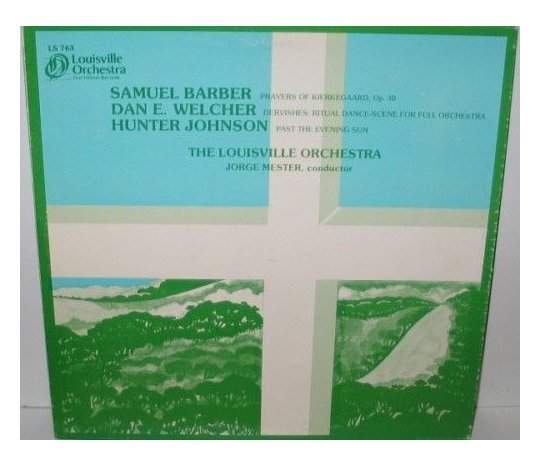 HJ: That’s a difficult question. By inspiration
I don’t mean going off in the blue wild yonder and doing something that has
never been heard of before, something that would not communicate, for example.
But inspiration is a difficult thing to define anyway. I don’t mean
inspiration from on high, but something alive and individual, and with its
own personal cast. I’ve never encouraged going off into the wild blue
yonder and doing something which is apart from the accepted musical practice.
Even with the more advanced sort that does not communicate. That has
been one of the great problems in twentieth century music, especially recent
twentieth century music, and it was neglected in the academic scenes over
the years to a great extent.
HJ: That’s a difficult question. By inspiration
I don’t mean going off in the blue wild yonder and doing something that has
never been heard of before, something that would not communicate, for example.
But inspiration is a difficult thing to define anyway. I don’t mean
inspiration from on high, but something alive and individual, and with its
own personal cast. I’ve never encouraged going off into the wild blue
yonder and doing something which is apart from the accepted musical practice.
Even with the more advanced sort that does not communicate. That has
been one of the great problems in twentieth century music, especially recent
twentieth century music, and it was neglected in the academic scenes over
the years to a great extent.
BD: After giving
all that advice to your students, did you follow that advice in your own composition?
HJ: It’s very difficult
to evaluate oneself in that respect, but I believe so, more or less!
BD: Have you been
basically pleased with the performances you have heard of your music over
the years?
HJ: I am not so
much displeased as not entirely happy. [Laughs] Even with the
best performers, my chief problem has been in the area of tempo. I
conduct to get across to the performers the idea that they must follow the
indicated metronomic markings. Stravinsky had the same problem.
It’s one reason he became a conductor — so that he
could play his music at the proper speed.
BD: Is the composer
the ideal interpreter of his music?
HJ: Not necessarily.
I found that you put things down in the score, and then do different things
when you perform it yourself. Incidentally, the recordings that I’m
suggesting I’m not completely happy with were because I was not able, for
one reason or another, to be present at any of the recording sessions.
The slow sections in all those works tended to be taken rather too slowly.
BD: But otherwise,
are they pleasing to you?
HJ: Yes.
The Louisville Orchestra did a fine job on Past the Evening Sun. Jorge Mester was conducting.
* *
* * *
BD: What do you
expect of the audience that comes to hear your music?
HJ: Quite frankly,
I expect in case of most members of the audience a warm response because
my music is not written in an avant-garde idiom at all. In fact I’ve
made it rather conservative, so I don’t think of it as any of a problem for
most audiences, unless they’re really unsophisticated. You’re not going
to find them in university communities or the larger cities now. The
question of the audience response is one of the biggest problems in recent
music. A good many of the composers who have tried to write a very
avant-garde type music have forgotten that any language, especially musical
language, has to be based in a common experience. That is why a great
deal of twentieth century music will probably not last too long because it
misuses the language, or rather tries to create a new language that does
not have sufficient basis in the common experience. I’m not arguing
here for playing folk music or anything as simple as that, but Schoenberg,
for example, created a totally new language in my estimation. One person
usually cannot do that. It keeps going back to the matter of the common
heritage. The greatest of originality in any art is that which takes
the common language of that point and advances it. Not too much, but
it advances it just far enough to get the result and all of the freshness
and individuality and even a bit of strangeness, but not too strange, not
too far removed from the common sources of the language.
BD: In other words,
to make some progress but not scrap it and start anew?
HJ: One of the
greatest problems in twentieth century music recently is over-complexity,
and writing music in which there is not enough contrast. The great problem
is insufficient variation of structure in the larger aspects of structure,
not contrast. That’s true of so much of it. Very often it will
go on for ten or fifteen minutes perhaps with the same kind of texture.
The details are always different, of course, but those are minute differences
that you don’t really notice. The overall affect is one of monotony,
and that’s a very common complaint. The last movement of Boulez’s Third Piano Sonata just goes on and on
and on the same texture. It’s unbearable after a while! However,
the Marteau sans Maître, for
example, has the requisite structural contrast.
BD: Are you optimistic
about the whole future of music?
HJ: I’m always
optimistic because trends now are moving toward establishing more contact
with what I call the roots of the musical language. I think that even
Rock is going to have some influence on it. I’m not a great devote
of Rock, but I think it’s going to have some influence on the serious music
of the future. So I feel bound to be optimistic about the future of
music.
BD: Do you feel
that we should try to get the Rock audiences into the concert halls?
HJ: Yes.
Whether we’d have much success at it I don’t know,
but I think it would be a very good idea if they could just absorb some of
the greater complexity of language and more interesting aspects of musical
language. The basic language the rockers use is still so simple, and
unless you’ve got a terrific imagination you don’t then do much with it.
You have the thousands of songs, and they tend to be pretty commonplace,
you know, boring I feel. There you go!
BD: When you’re
writing a piece of music, you go over it and touch it up and you work on
it. How do you know when you have finished?
HJ: I sense when
something is not quite right, and when I finally get it right, I know it.
I know it inside me and I have no doubt about it. It’s hard to define
just what it is, but there’s always that satisfaction then. Usually
it’s some technical thing that you’ve worked at. You find some technical
thing that doesn’t quite come out right.
BD: Do you ever
go back and revise scores after they’ve been published?
HJ: I don’t know
about when they’ve actually been published, but I’ve done a great deal of
revision on certain scores. The Piano
Sonata, for example, was first written in the 1930s, and then I revised
it considerably several years later, in 1948, before it was published.
I’d not been completely satisfied with certain aspects of it, practicability
and performance, for one thing, and I was able to give it a greater clarity
of intent in other portions. I worked it over just before it was published.
I spent several months on it in fact. I’m finding I’m happy with it,
satisfied with it. It’s worked out very well since.
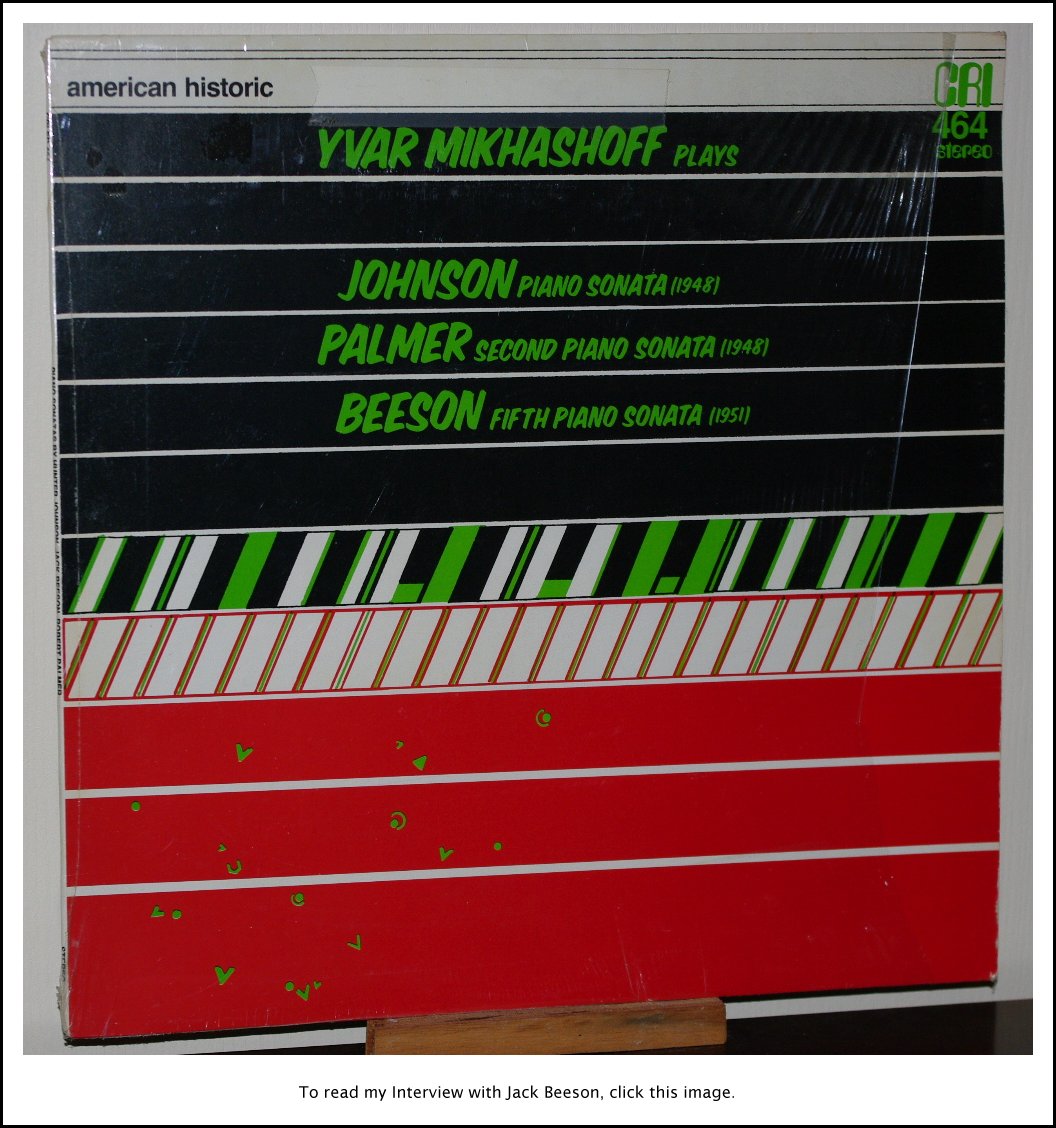
BD: Are you also
a performer as well as a composer?
HJ: Not really.
I am no longer a good pianist, but I was a fairly good pianist at one time
when I was teaching. Over the years in general I had to do several performances,
but performing never did interest me completely in the end.
BD: Did being a
performer make you a better composer?
HJ: Yes, I think
so, particularly for the piano. I can think of composers who were not
pianists, and it shows. It does show in the piano works. I won’t
give you names, but this is true to a greater extent than composers who write
for stringed instruments who do not play those instruments. I don’t
know why what should be, but it appears to be.
BD: Perhaps it’s
because playing the piano is considerably more complicated than playing a
violin or a trumpet.
HJ: Yes, perhaps
that’s it. I would think it would be, yes.
BD: What advice
do you have for the young composers coming along who want to write pianistically?
HJ: Sit and play
at the piano a little! [Both laugh] Learn to play a little bit.
Get the feel for the instrument. I always think it’s very instructive
to point out to them and show them the difference in the approach to the
piano and the orchestra. Get some orchestral works and try and do them
for the piano. They will find it’s a great exercise in teaching them
what is detected on the piano, for example.
BD: What advice
do you have for the young performers coming along?
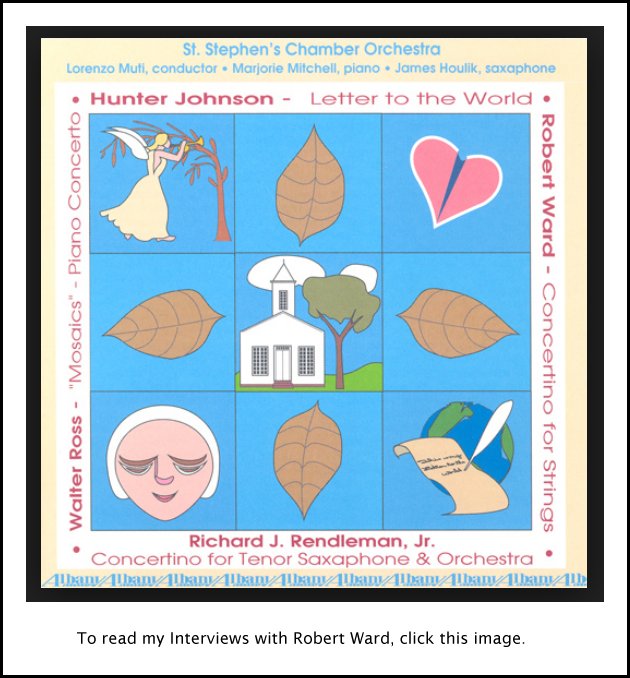 HJ: Oh, I wouldn’t attempt to give the young
performers any advice. I am very happy with most young performers that
I’ve heard. I’m glad to see them getting away from the old romanticized
interpretations of music. Some would say that many of them tend to
be too mechanical in performance, but I don’t feel that. The approach
of a pianist like Glenn Gould is thought by some to be too mechanistic, but
I don’t. In many of the pieces the method of the music is right.
They’re in the notes. You don’t have to over-sentimentalize and do
little things for distortions of the tempo and such matters of interpretation.
It’s been one of the problems I’ve had with some of the young pianists.
They still tend to fall into that old over-romanticized concept of music,
which is basically romantic. Inevitably playing a slow section is to
over-sentimentalize it, to slow it down and ‘schmaltz’ it up a bit!
That seems to be a great temptation.
HJ: Oh, I wouldn’t attempt to give the young
performers any advice. I am very happy with most young performers that
I’ve heard. I’m glad to see them getting away from the old romanticized
interpretations of music. Some would say that many of them tend to
be too mechanical in performance, but I don’t feel that. The approach
of a pianist like Glenn Gould is thought by some to be too mechanistic, but
I don’t. In many of the pieces the method of the music is right.
They’re in the notes. You don’t have to over-sentimentalize and do
little things for distortions of the tempo and such matters of interpretation.
It’s been one of the problems I’ve had with some of the young pianists.
They still tend to fall into that old over-romanticized concept of music,
which is basically romantic. Inevitably playing a slow section is to
over-sentimentalize it, to slow it down and ‘schmaltz’ it up a bit!
That seems to be a great temptation.
BD: As you look
back over the thirty, forty, fifty, sixty years, have the performers gotten
better technically?
HJ: Oh yes, oh
heavens, yes. Much better.
BD: If they’ve
gotten better technically, have they also gotten better musically?
HJ: [Laughs]
I wouldn’t make a fat statement about that. They’ve been heading in
the right direction, as far as I’m concerned. When I hear sometimes
the recordings of the older pianists, I am terribly appalled at how inadequate
their technique is... people like Paderewski and Rubinstein.
BD: Are they just
sloppy?
HJ: It’s sloppy.
They don’t get all the notes and they mess it up with the pedals. There’s
too much pedal. That’s one tendency among the new performers that I
like — they don’t tend to overuse the pedal as the
older ones do.
BD: Have you written
some music for the voice?
HJ: Only a few
songs. I have never done a big choral work and I don’t know quite why.
I suppose the thought of a large group of singers seems to be an appalling
job.
BD: Tell me about
the joys and sorrows of writing for the human voice.
HJ: I never thought
of it as involving joys and horrors particularly but just the composing problems.
I never did an opera, for example. There one might imagine you’d run
into problems. I might mention incidentally that a great portion of
my work has been done in the field of ballet. I wrote three ballets
for Martha Graham. One in 1940, Letter
to the World [revised in 2014 and called At Summer’s Full], and the next one in 1943, Deaths and Entrances, and finally after
many years, The Scarlet Letter in
1975. Those first two had hundreds of performances worldwide, and I’m
thrilled to be better known for the music I did for Martha Graham than for
my other music. It was a happy collaboration, and it was very inspiring
to work with her.
BD: When she gave
you a commission, how much leeway did she allow you?
HJ: When I first
went to work with her, she wanted me to do the music in a rather mechanical
way, with so many bars of 4/4 and so many bars of this and that. I
told her, “I can’t work that way. I refuse to
work that way, but I’ll work with you if I can work freely. You give
me a scenario with the mood, ideas and the approximate length, and I’ll write
it. If we have to pare it down a little or extend it, fine.”
It was a little difficult for her at first, but she once she got to working
that way, she said she wouldn’t work any other way. She said she didn’t
know why she didn’t start it that way earlier.
BD: Were you ever
surprised at the kind of movements that were then used to your music?
HJ: Yes, sometimes!
[They both laugh] Yes, Miss Graham introduced them to the concept
of a counterpoint of music and motion, that doing somewhat unexpected things
occasionally in the dance to what one might anticipate, given the nature
of the music and the nature of the rhythm, and that works pretty well I think.
BD: If you write
something specifically for the dance, is it good then to take it into the
concert hall without the visual?
HJ: No, it isn’t
good as a rule. The original ballet Letter to the World was about fifty minutes
long, and I did a concert suite which was twenty or twenty-three minutes.
Much of the music will not stand too well on its own as concert music.
In fact, I recomposed much of the music put into concert suites. I added
voices, shortened things in places and expanded others in order to make it
work as concert music. Copland I believe did the same thing with Appalachian Spring, for example.
BD: Do you feel
music in and of itself works well on recordings? Is there a different
expectation upon the part of the composer when there is an audience of a
couple of thousand in a hall as opposed to an audience of one or two people
at home?
HJ: I don’t know
if I would venture an opinion on that. [Thinks for a moment]
As an aside I might say that I enjoy listening to music in recordings about
as much as I do in the concert hall. In fact, I often prefer to listen
to a good recording than going to a concert because of all the crowds and
distractions. But I’ve never been at all opposed to recorded music
as contrasted with the live concerts. I’m very enthusiastic about listening
to it along or with two or three people.
BD: What do you
feel is the ultimate purpose of music?
HJ: [Laughs]
I could give a rather simple, rather naive answer — to
make people happier — but that is inadequate.
I think music certainly fills a tremendous need and aspiration in our emotional
lives and extends to other aspects, too. It produces an enormous sense
of fulfillment for the listener, not just the artists and performers and
the composers. It’s almost akin to a religious experience in its ability
to give a person a great sense of relief and fulfillment. It enriches
one’s life enormously. In fact for me, the artistic experience, the
musical experience aesthetically is the ultimate experience, more so than
any religious experience without a doubt.
* *
* * *
BD: You’re in your
81st year.
HJ: Yes.
I can’t believe it, but I am.
BD: What are some
of the more surprising things that you have noticed about the direction of
music over this length of time?
HJ: I can’t say
that there is very much that has surprised me, really. The most surprising
single thing, actually, was concerning the certain movement in American academic
music. In the 1960s, particularly, in all the academies —
I mean that in the general sense, the university and conservatory
music departments — all the interest among most of
the composition teachers, and certainly the students, was on serialism.
They had to write in that particular style, idiom, language, whatever you
want to call it, otherwise you were hopelessly old-fashioned. You were
outside the pale. By the early 1970s, the thing had collapsed completely.
I suppose there are a few students who learned the technique, but very little
is being written in serialism. Nearly all my students at one time just
wanted to write in the style of Webern; not Schoenberg particularly, but
Webern. Its simplicity appeals to them a great deal, and it had a great
deal to teach them, so I let them write some things in Webern’s style.
BD: Did they also
try to imitate his brevity?
HJ: I had to work
on that with them! [Both have a huge laugh] That is the thing
that brought a surprise — the utter collapse of the
serial music in America.
BD: Are you glad
that it’s gone?
HJ: In a way there’s
much to be learned from serial techniques, but applied too rigorously it produces
essentially arid music. Now things have gone off in all directions,
you might say, and I don’t know what’s going to happen next. All styles
are being accepted, and the very significant music which can be written in
the future is going to have some tendencies towards amalgamation of various
approaches and techniques. It will have something incorporating a little
more of the popular language, perhaps just a little of that, and perhaps
a rediscovery of the contrast of a larger aspect of structure. I refer
for the moment to the ideas of too many notes and too much monotony.
There is the need to rediscover the kind of approach to form that you find
in Beethoven. It’s got wonderful contrast. There is always the
center of expectation with something to come, and you don’t get that much
in contemporary music. A great deal of music being written today turns
out to be what I like to call ‘texture music’,
and it becomes that inadvertently. ‘Texture music’
has a chance of being wonderful with some of the things written... Ligeti,
for example. But if there’s a sufficient amount of contrast and larger
portions of the overall form, you can write textured music. But there
has got to be a basic contrast in the kind of texture you use, and that’s
something that even texture composers like Elliott Carter and Boulez
and others don’t seem to have been too able to do at all.
BD: Is there any
hope for these composers?
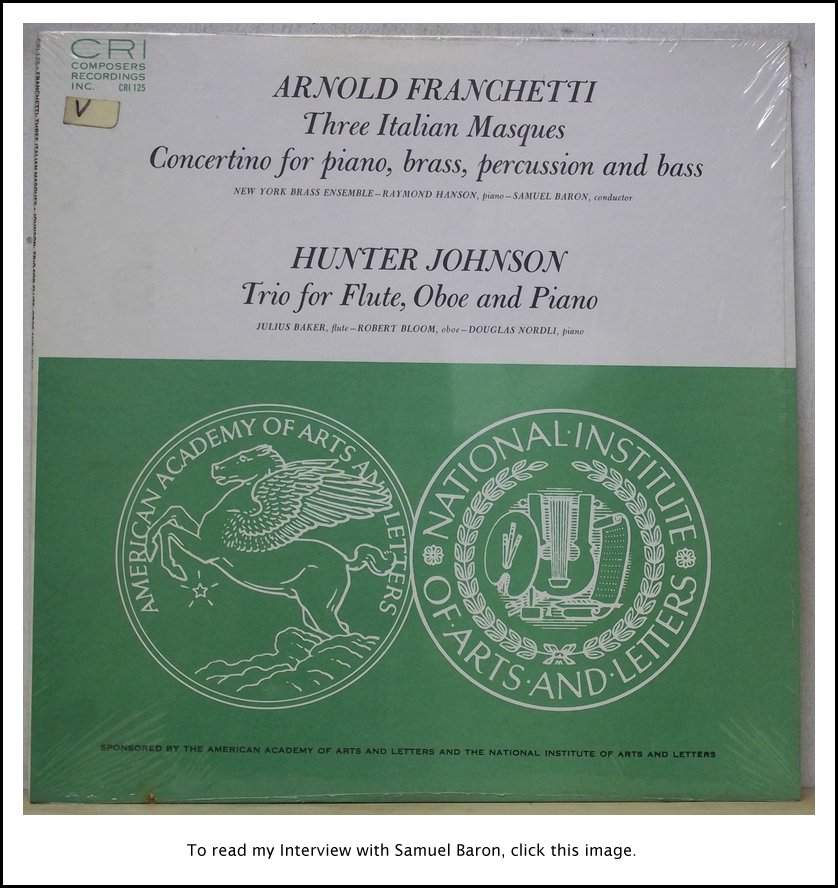
HJ: [Laughs]
Oh yes! Things move on regardless of everything, and what it boils
down to is when sufficient talents come along, they’ll make these amalgamations
and unifications and write just what is needed. I don’t think it’s
the sort of thing that can be done by making too much thought about it.
Just knowing in itself is not enough. We have certainly by far the
most sophisticated composers and artists in every area the world has ever
known. They know everything, and they are self-aware. There’s
never been an age in which self-awareness was so pronounced. Of course
a good artist, a good creator has to be self-aware, but when it is carried
too far it tends to stifle the best. Sometimes the really big talents
come along, such as Stravinsky and Bartók, and in this country Copland.
I have great reservations about much of Ives’s music. I’ve heard people
say that he knew exactly what he was doing, and that he placed every note
exactly where he intended to place it. Perhaps so, but I have some
doubts about that. He is at his best in something like The Unanswered Question. That’s
terrific, but at moments in the Fourth
Symphony and the Concord Sonata
he storms all over the place. [Laughs] Perhaps I shouldn’t be
saying all this about other composers!
BD: Without naming
names, do you feel that there are potential giants coming along?
HJ: That I can’t
answer because for a decade or so I’ve not really kept up with what’s
going on among the young composers. I heard some of the music of Philip Glass...
BD: Oh, the ‘minimalist’,
yes!
HJ: Yes.
I like some of his music, but much of it I find very boring. It’s too
simplistic, too repetitive, so for me he’s not the kind I’d be looking for.
BD: And yet he’s
gaining wide acceptance.
HJ: Yes, I know.
I think that’s because of the top element, and all the hype and the hoopla,
and all the spectacular events, and the advertising. That has become
such a part of the music scene and of all the art scenes that the person
and the hype and the hoopla surrounding the person taken together almost
overshadows what the artist has to say. To a certain extent this is
not tasteful.
* *
* * *
BD: You have had
quite a number of commissions...
HJ: In the past,
yes, but not in recent years. I’ve haven’t been an active composer
now for the last decade or so.
BD: But when you
had commissions, how did you decide which ones you would accept and which
ones you would decline?
HJ: I don’t think
I was offered one that I didn’t accept. I’ve always accepted commissions
unless there was too much of a limitation on the time they would wish to finish
the work. I’d never work under great pressure.
BD: [With a gentle
nudge] If they wanted a four-movement symphonic work for large orchestra
next week, you would say no?
HJ: [Laughs]
Probably! That would be just impossible for me. I never wrote
with the greatest of ease. I just never turned out work one after the
other. In fact my total output is not great, and I’ve never considered
myself a prolific composer, particularly in view of the fact that I’ve
spent so much time teaching. But I always like to feel that I concentrated
what I had to say in relatively a few works rather than spreading it out.
There’s a tendency for some composers to write too easily and repeat themselves
too much. Of course there’s many historical precedents for that.
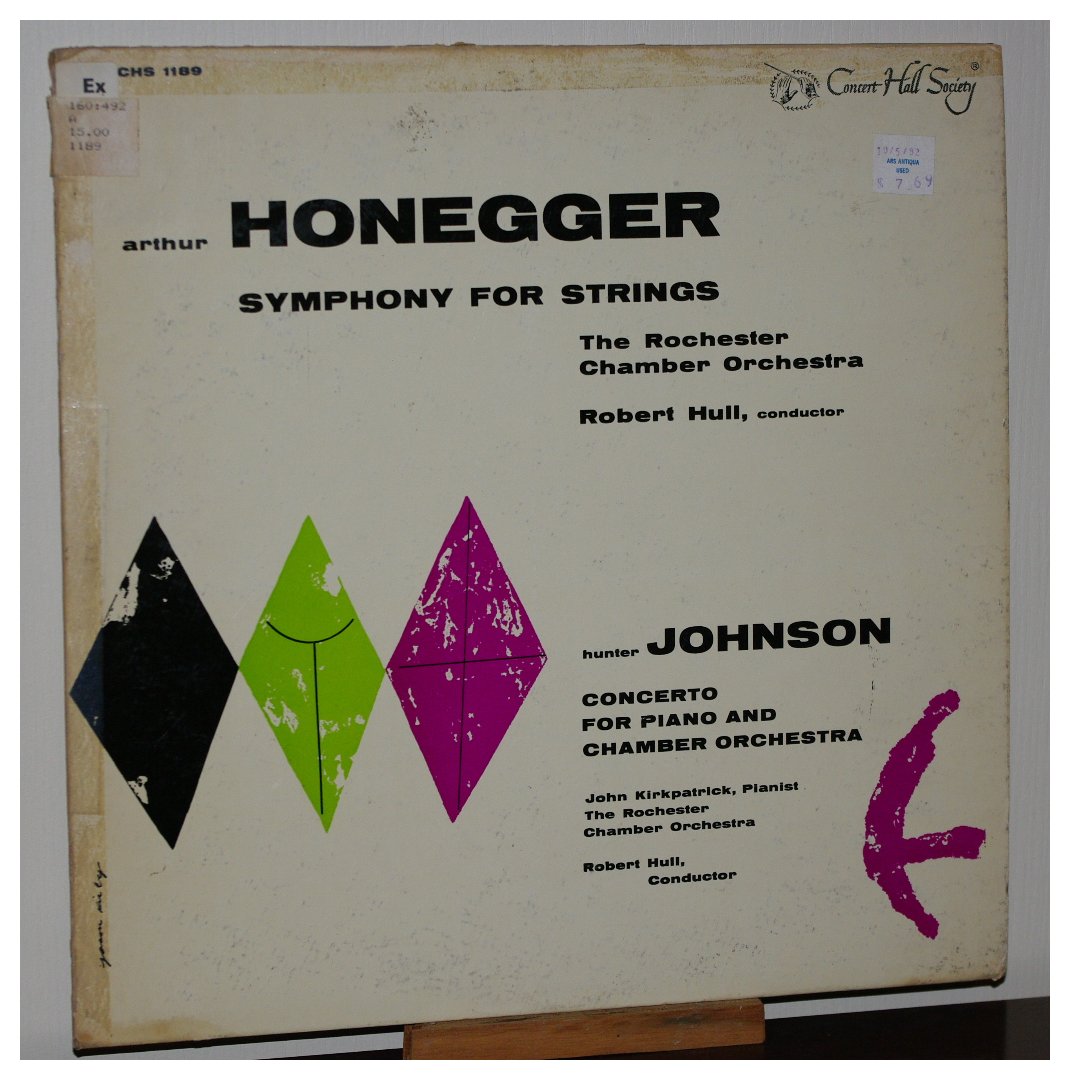
BD: When you were
composing, was the act of composing fun?
HJ: Oh, yes!
It was hard work and it was fun mixed with a certain misery in the nature
of frustration more than anything else. It wouldn’t come right for
some time, but when it finally came right, and you developed a really fine
idea and played it over, you got as glorious a feeling as one could possibly
imagine. I read about the Ecstasy of the Saints, and I always said
that for me the ultimate in ecstasy was writing a passage that really came
off even better than I anticipated.
BD: I’m glad you
had that opportunity many times.
HJ: Yes, so am
I.
BD: You say you’ve
not been very active in the last ten years. Are you still composing
at all?
HJ: Not really,
not at the present time. I’m dashing round with some material from
this ballet, Scarlett Letter.
I’m wanting to make a shortish piano suite out of it, but I find that it
was orchestrally conceived. It’s difficult to take an orchestral work
and try and make a genuine piano piece out of it. Some of it works
all right in this case, and some doesn’t. I had hoped to have that
finished by now, but I had serious health problems in the spring and I haven’t
quite recovered from that yet. So I don’t know what will happen in
the future.
BD: I hope that
you still have many more years of creative life ahead of you.
HJ: Well, thank
you. I hope so too. It’s a great pleasure for me to respond to
your invitation to participate in this series. I hope it works out
all right.
BD: I’m sure it
will. It’s been a great pleasure to chat with you. I’m glad that
we were able to make the contact and get together on the phone.
HJ: Yes, so am
I.
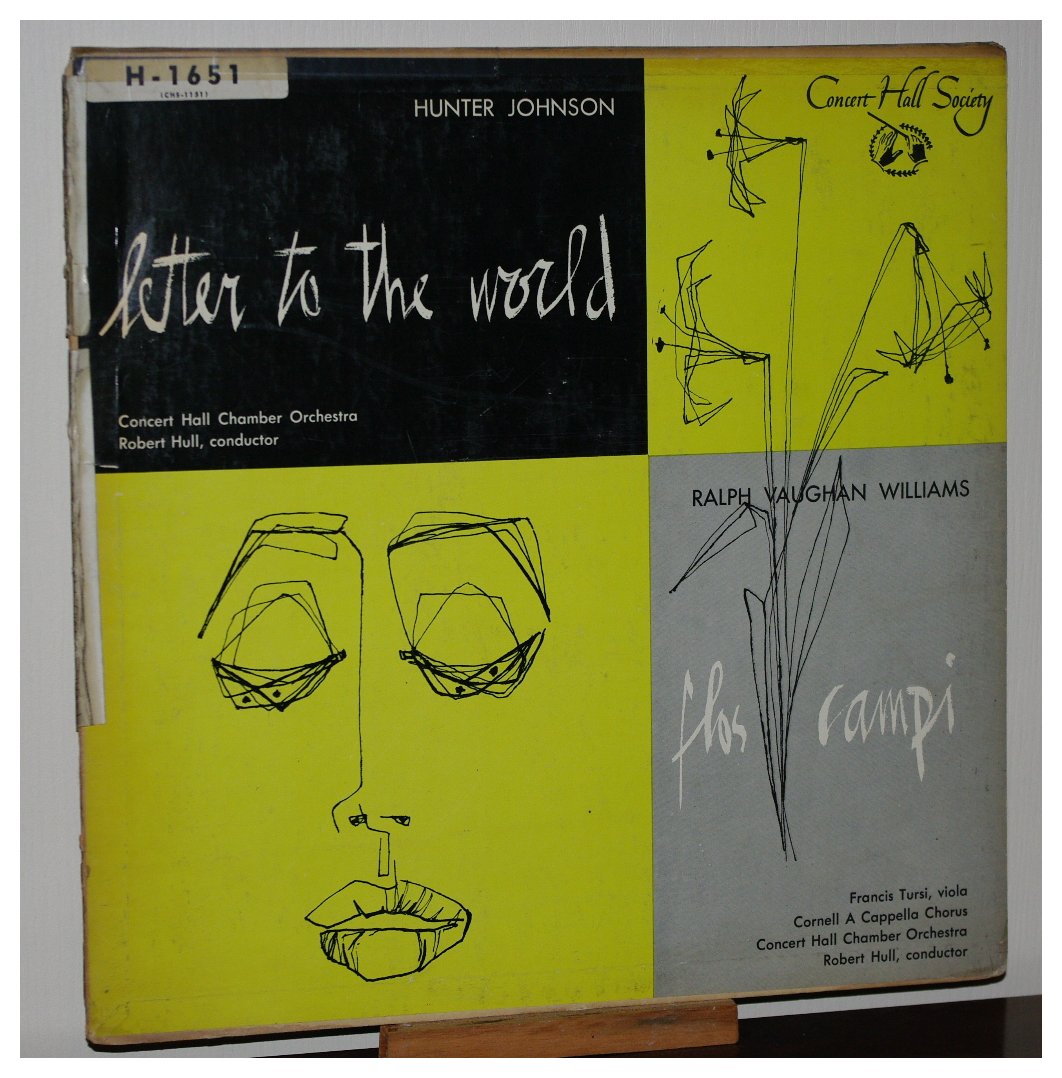
© 1987 Bruce Duffie
This conversation was recorded on the telephone on September 5, 1987.
Portions were broadcast on WNIB (along with recordings) six months later,
and again in 1991 and 1996. This transcription was made early in 2015,
and posted on this website at that time. My thanks
to British soprano Una Barry for her
help in preparing this website presentation.
To see a full list (with links) of interviews which have been transcribed
and posted on this website, click here.
Award -
winning broadcaster Bruce Duffie was with WNIB, Classical
97 in Chicago from 1975 until its final moment
as a classical station in February of 2001. His
interviews have also appeared in various magazines and journals
since 1980, and he now continues his broadcast series on WNUR-FM.
You are
invited to visit his website
for more information about his work, including
selected transcripts of other interviews, plus a full
list of his guests. He would also like to call your
attention to the photos and information about his grandfather,
who was a pioneer in the automotive field more than a century ago.
You may also send him E-Mail
with comments, questions and suggestions.


 In gathering material, I sought out musicians that interested me, and sometimes
one guest would suggest others, and even provide me with contact information.
Such was the case with Hunter Johnson.
In gathering material, I sought out musicians that interested me, and sometimes
one guest would suggest others, and even provide me with contact information.
Such was the case with Hunter Johnson. HJ: That’s a difficult question. By inspiration
I don’t mean going off in the blue wild yonder and doing something that has
never been heard of before, something that would not communicate, for example.
But inspiration is a difficult thing to define anyway. I don’t mean
inspiration from on high, but something alive and individual, and with its
own personal cast. I’ve never encouraged going off into the wild blue
yonder and doing something which is apart from the accepted musical practice.
Even with the more advanced sort that does not communicate. That has
been one of the great problems in twentieth century music, especially recent
twentieth century music, and it was neglected in the academic scenes over
the years to a great extent.
HJ: That’s a difficult question. By inspiration
I don’t mean going off in the blue wild yonder and doing something that has
never been heard of before, something that would not communicate, for example.
But inspiration is a difficult thing to define anyway. I don’t mean
inspiration from on high, but something alive and individual, and with its
own personal cast. I’ve never encouraged going off into the wild blue
yonder and doing something which is apart from the accepted musical practice.
Even with the more advanced sort that does not communicate. That has
been one of the great problems in twentieth century music, especially recent
twentieth century music, and it was neglected in the academic scenes over
the years to a great extent. HJ: Oh, I wouldn’t attempt to give the young
performers any advice. I am very happy with most young performers that
I’ve heard. I’m glad to see them getting away from the old romanticized
interpretations of music. Some would say that many of them tend to
be too mechanical in performance, but I don’t feel that. The approach
of a pianist like Glenn Gould is thought by some to be too mechanistic, but
I don’t. In many of the pieces the method of the music is right.
They’re in the notes. You don’t have to over-sentimentalize and do
little things for distortions of the tempo and such matters of interpretation.
It’s been one of the problems I’ve had with some of the young pianists.
They still tend to fall into that old over-romanticized concept of music,
which is basically romantic. Inevitably playing a slow section is to
over-sentimentalize it, to slow it down and ‘schmaltz’ it up a bit!
That seems to be a great temptation.
HJ: Oh, I wouldn’t attempt to give the young
performers any advice. I am very happy with most young performers that
I’ve heard. I’m glad to see them getting away from the old romanticized
interpretations of music. Some would say that many of them tend to
be too mechanical in performance, but I don’t feel that. The approach
of a pianist like Glenn Gould is thought by some to be too mechanistic, but
I don’t. In many of the pieces the method of the music is right.
They’re in the notes. You don’t have to over-sentimentalize and do
little things for distortions of the tempo and such matters of interpretation.
It’s been one of the problems I’ve had with some of the young pianists.
They still tend to fall into that old over-romanticized concept of music,
which is basically romantic. Inevitably playing a slow section is to
over-sentimentalize it, to slow it down and ‘schmaltz’ it up a bit!
That seems to be a great temptation.
